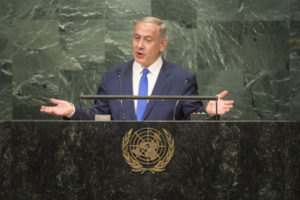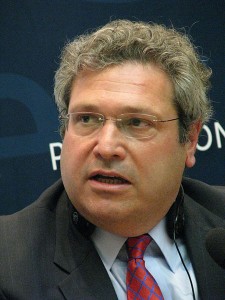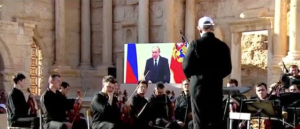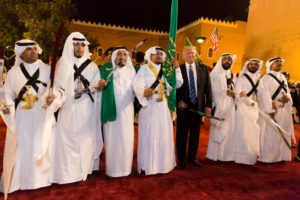Syria’s Survival Is Blow to Jihadists
Despite last-ditch efforts by Israel and its allies to salvage the “regime change” project in Syria, the looming defeat of the Western-backed jihadists marks a turning point in the modern Middle East, says ex-British diplomat Alastair Crooke.
Syria’s victory in remaining still standing – still on its feet, as it were – amid the ruins of all that has been visited upon her, marks effectively the demise of the Bush Doctrine in the Middle East (of “the New Middle East”). It signals the beginning of the end – not just of the political “regime change” project, but also of the Sunni jihadi project which has been used as the coercive tool for bringing into being a “New Middle East.”

Syrian refugees await the arrival of Secretary-General Ban Ki-moon during his visit to the Zaatari Refugee Camp, located near Mafraq, Jordan. The settlement has grown to house nearly 80,000 Syrian refugees since it opened in 2012. March 27, 2016. (Photo from the United Nations)
Just as the region has reached a geopolitical inflection point, however, so too, has Sunni Islam. Wahhabi-inspired Islam has taken a major hit. It is now widely discredited amongst Sunnis, and reviled by just about everyone else.
Just to be clear how linked were the two projects:
In the wake of the first Gulf War (1990-91), General Wesley Clark, former NATO Supreme Allied Commander for Europe, recalled: “In 1991, [Paul Wolfowitz] was the Undersecretary of Defense for Policy … And I had gone to see him (…)
“And I said, ‘Mr. Secretary, you must be pretty happy with the performance of the troops in Desert Storm.’
“And he said: ‘Yeah, but not really, because the truth is we should have gotten rid of Saddam Hussein, and we didn’t … But one thing we did learn is that we can use our military in the region?—?in the Middle East?—?and the Soviets won’t stop us. And we’ve got about 5 or 10 years to clean up those old Soviet client regimes?—?Syria, Iran, Iraq?—?before the next great superpower comes on, to challenge us.’”
Wolfowitz’s thinking was then taken up more explicitly by David Wurmser in his 1996 document, Coping with Crumbling States (following on from his contribution to the infamous Clean Break policy strategy paperwritten by Richard Pearle for Bibi Netanyahu earlier in the same year). The aim here for both these seminal documents was to directly counter the allegedly “isolationist” thinking of Pat Buchanan (now arisen again in parts of the U.S. New Right and Alt-Right).
Libertarian writer Daniel Sanchez has noted: “Wurmser characterized regime change in Iraq and Syria (both ruled by Baathist regimes) as ‘expediting the chaotic collapse’ of secular-Arab nationalism in general, and Baathism in particular. He [asserted that] ‘the phenomenon of Baathism,’ was, from the very beginning, ‘an agent of foreign, namely Soviet policy’ … [and therefore advised] the West to put this anachronistic adversary ‘out of its misery’ – and to press America’s Cold War victory on toward its final culmination. Baathism should be supplanted by what he called the ‘Hashemite option.’ After their chaotic collapse, Iraq and Syria would be Hashemite possessions once again. Both would be dominated by the royal house of Jordan, which in turn, happens to be dominated by the US and Israel.”
Influencing Washington
Wurmser’s tract, Coping with Crumbling States, which together with Clean Break was to have a major impact on Washington’s thinking during the George W. Bush administration (in which David Wurmser also served). What aroused the deep-seated neocon ire in respect to the secular-Arab nationalist states was not just that they were, in the neo-con view, crumbling relics of the “evil” USSR, but that from 1953 onwards, Russia sided with these secular-nationalist states in all their conflicts regarding Israel. This was something the neo-cons could neither tolerate, nor forgive.

Benjamin Netanyahu, Prime Minister of Israel, addresses the United Nations General Assembly, Sept. 22, 2016 (UN Photo)
Both Clean Break and the 1997 Project for a New American Century(PNAC) were exclusively premised on the wider U.S. policy aim of securing Israel. The point here is that while Wurmser stressed that demolishing Baathism must be the foremost priority in the region, he added: “Secular-Arab nationalism should be given no quarter” – not even, he added, “for the sake of stemming the tide of Islamic fundamentalism”. (Emphasis added).
In fact, America had no interest in stemming the tide of Islamic fundamentalism. The U.S. was using it liberally: It had already sent in armed, fired-up Islamist insurgents into Afghanistan in 1979 precisely in order to “induce” a Soviet invasion (one which subsequently duly occurred).
Asked, much later, in view of the terrorism that subsequently occurred, whether he regretted stoking Islamic extremism in this way, President Jimmy Carter’s National Security Advisor Zbig Brzezinski replied:
“Regret what? That secret operation was an excellent idea. It had the effect of drawing the Russians into the Afghan trap and you want me to regret it? The day that the Soviets officially crossed the border, I wrote to President Carter, essentially: ‘We now have the opportunity of giving to the USSR its Vietnam war.’”
Fired-up Sunni radicals have now been used by Western states to counter Nasserism, Ba’athism, the USSR, Iranian influence, and latterly to try to overthrow President Bashar al-Assad in Syria. One former CIA official in 1999, described the thinking at the time thus:
“In the West, the words Islamic fundamentalism conjure up images of bearded men with turbans and women covered in black shrouds. And some Islamist movements do indeed contain reactionary and violent elements. But we should not let stereotypes blind us to the fact that there are also powerful modernizing forces at work within these movements. Political Islam is about change. In this sense, modern Islamist movements may be the main vehicle for bringing about change in the Muslim world and the break-up of the old ‘dinosaur’ regimes.” (Emphasis added).
Protecting the Emirs
Precisely: This was what the Arab Spring was about. The role allocated to Islamist movements was to break up the nationalist-secular Arab world (Wurmser’s “Secular-Arab nationalism should be given no quarter”), but additionally to protect the kings and Emirs of the Gulf, to whom America was obliged to tie itself – as Wurmser explicitly acknowledges – as the direct counter-party in the project of dissolving the nationalist secular Arab world. The kings and emirs of course, feared the socialism that was associated with Arab nationalism (— as did the Neocons).

Prominent neocon intellectual Robert Kagan. (Photo credit: Mariusz Kubik, http://www.mariuszkubik.pl)
Dan Sanchez perceptively writes (well before Russia’s intervention into the Middle East), that Robert Kagan and fellow neocon, Bill Kristol, in their 1996 Foreign Affairs article, Toward a Neo-Reaganite Foreign Policy, sought to inoculate both the conservative movement and U.S. foreign policy against the isolationism of Pat Buchanan:
“The Soviet menace had recently disappeared, and the Cold War along with it. The neocons were terrified that the American public would therefore jump at the chance to lay their imperial burdens down. Kristol and Kagan urged their readers to resist that temptation, and to instead capitalize on America’s new peerless pre-eminence … [that] must become dominance wherever and whenever possible. That way, any future near-peer competitors would be nipped in the bud, and the new ‘unipolar moment’ would last forever … What made this neocon dream seem within reach, was the indifference of post-Soviet Russia.”
And, the year after the Berlin Wall fell, war against Iraq marked the début of the re-making the Middle East: for America to assert uni-polar power globally (through military bases); to destroy Iraq and Iran; to “roll-back Syria” (as Clean Break had advocated) – and to secure Israel.
Russia Is Back
Well, Russia is back in the Middle East – and Russia is no longer “indifferent” to America’s actions – and now “civil war” has erupted in America between those who want to punish Putin for spoiling America’s unipolar moment in the region so thoroughly, and so finally – with Syria – and the other policy orientation, led by Steve Bannon, which advocates precisely the Buchanan-esque U.S. foreign policy which the neocons had so hoped to despoil (… plus ça change, plus c’est la même chose).

Russian President Vladimir Putin addressing the audience at a concert for Palmyra, Syria, after its liberation from ISIS, via a satellite link on May 5, 2016. (Image from RT’s live-streaming of the event)
It is very plain however, that one thing has changed: Sunni jihadists’ long “run” as the tool of choice for re-making the Middle East is over. The signs are everywhere:
The leaders of the five emerging market BRICS powers have for the first time namedmilitant groups based in Pakistan as a regional security concern and called for their patrons to be held to account:
“We, in this regard, express concern on the security situation in the region and violence caused by the Taliban, (Islamic State) …, Al-Qaeda and its affiliates including Eastern Turkistan Islamic Movement, Islamic Movement of Uzbekistan, the Haqqani network, Lashkar-e-Taiba, Jaish-e-Mohammad, TTP and Hizb ut-Tahrir,” the leaders said in the declaration. (Pakistan and Saudi Arabia will need to take note).
Similarly, an article published in an Egyptian newspaper written by Britain’s Middle East minister, Alistair Burt, suggests that London now whole-heartedly supports the Sisi regime in Egypt in its war on the Muslim Brotherhood. Burt attacked the M.B. for links to extremism, while emphasizing that Britain has imposed an outright ban on any contact with the organization since 2013 – adding that “now is the time for everyone who defends the Brotherhood in London or Cairo to put an end to this confusion and ambiguity.” Not surprisingly, Burt’s remarks have been greeted with profound pleasure in Cairo.
While it is quite true that there were well-intentioned and principled men and women amongst Sunni Islamists who originally had wanted to recover Islam from the doldrums it had found itself by the 1920s (with the abolition of the Caliphate), the fact is (unfortunately), that this same period coincided with the first Saudi king, Abdul Azziz’s notion (enthusiastically supported by Britain) to use fired-up Wahabbism as the means for him to rule all of Arabia. What subsequently happened (ending with the recent violent attacks in European cities) is not so surprising: most of these Islamist movements were tapped in to the Saudi petro-dollar spigot, and to the Wahhabist notion of its own violent exceptionalism (Wahhabism is alone in claiming to be “the one true Islam”).
Politically Instrumental
And as Islam became increasingly instrumentalized politically, so the more violent strain in it, inevitably, became predominant. Inevitably, the spectrum of Sunni Islamist movements – including those viewed as “moderates” – became incrementally closer to Wahhabi intolerant, dogmatic, literalism – and to embracing extremist violence. In practice, even some nominally non-violent movements – including the Muslim Brotherhood – have allied themselves, and fought with, Al-Qaeda forces in Syria, Yemen and elsewhere.

President Donald Trump poses for photos with ceremonial swordsmen on his arrival to Murabba Palace, as the guest of Saudi King Salman, May 20, 2017, in Riyadh, Saudi Arabia. (Official White House Photo by Shealah Craighead)
So, what now: the failure of Wahabbist movements to make political achievements is complete. It seems so short a time since young Muslim men – including ones who had lived their lives in the West – were truly inspired by the very radicalism and the promise of Islamic apocalypse. The Dabiq prophesy (of arriving redemption) then seemed close to fulfillment for these young adherents. Now that is dust. Wahabbism is thoroughly discredited by its careless brutality. And Saudi Arabia’s claims to political savoir faire, and Islamic authority, has suffered a major blow.
What is less obvious to the outside world is that this blow has been delivered in part by the mostly Sunni Syrian Arab Army. For all the stereotyping and propaganda in the Western world of the Syria conflict as Shi’a versus Sunni, it was Syrian Sunnis who fought – and died – for their Levantine Islamic tradition, against the blown-in, exceptionalist, intolerant, orientation recently brought (post-World War Two) into the Levant from the Saudi Nejd desert (Wahabbism originally arose in the Nejd desert of Saudi Arabia).
In the aftermath of the Syria war and the aftermath of ISIS murderous brutality in Mosul, many Sunnis have had more than enough of this Wahabbi orientation of Islam. There is likely to be a revival of the notion of secular, non-sectarian nationalism in consequence. But also, the traditional Levantine model of a tolerant, more inwardly orientated, quasi-secular, Islam will enjoy a revival.
Whereas fired-up Sunnism used as a political tool may be “down,” radical reformist Sunni Islam, as a sub-culture, is certainly not “out.” Indeed, as the pendulum now swings against Sunni movements globally, the hostility already being generated is very likely to feed the sense of Islam being besieged and attacked; of usurpation of its lands and authority; and of dispossession (of the state, which Sunnis have tradition thought as being “of them”). The puritan, intolerant strain in Islam has been present since the earliest times (Hanbali, Ibn Taymiyya and, in the Eighteenth Century, Abd-el Wahhab), and this orientation always seems to arise at times of crisis within the Islamic world. ISIS may be defeated, but this orientation is never fully defeated, nor disappears completely.
The “victor” in this sub-sphere is Al Qaeda. The latter predicted the failure of ISIS (a physically-situated Caliphate being premature, it argued). Al Qaeda leader Ayman al-Zawahiri has been proved to have been correct in his judgment. Al Qaeda will sweep up the remnants from both ISIS, on one hand, and the angry and disillusioned members of the Muslim Brotherhood, on the other. In a sense, we may see a greater convergence amongst Islamist movements (especially when the Gulf paymasters step back).
We are likely to witness a reversion to Zawahiri’s virtual, global jihad intended to provoke the West, rather than to defeat it militarily – as opposed to any new attempt to seize and control a territorial Emirate.
Expect the shrines at (Shi’i) Kerbala and Najaf to start outshining those of (Sunni) Mecca and Medina. In fact, they already are.
Alastair Crooke is a former British diplomat who was a senior figure in British intelligence and in European Union diplomacy. He is the founder and director of the Conflicts Forum.




Geen opmerkingen:
Een reactie posten